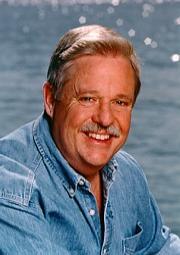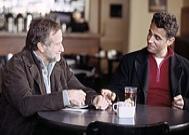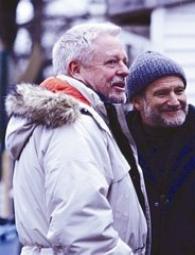
Close Encounters of the Celebrity Kind...
Tales of the Night: An interview with Armistead Maupin
Expanded Edition from the 8/2/05 issue of Windy City Times
by Richard Knight, Jr.
Expanded Edition from the 8/2/05 issue of Windy City Times
by Richard Knight, Jr.
Writer and gay icon Armistead Maupin, on set of The Night Listener with star Robin Williams, co-star Toni Collette as Donna, the
protective mother of Pete, Williams as Maupin's alter ego Gabriel Noone with screen lover Jess (Bobby Cannavale) and mysterious,
tragic, illusive Pete (Rory Culkin)
protective mother of Pete, Williams as Maupin's alter ego Gabriel Noone with screen lover Jess (Bobby Cannavale) and mysterious,
tragic, illusive Pete (Rory Culkin)
If I sound like I have a bit of a teenage boy high school crush on acclaimed writer Armistead Maupin it’s because I do. What writer,
gay or straight wouldn’t? Now Maupin, famed for his “Tales from the City” books and high profile status within the gay community,
has penned his first feature script (along with his ex-partner, Terry Anderson). This is for The Night Listener, a mystery with strong
hints of Hitchcock that stars Robin Williams and Toni Collette. Williams plays writer Gabriel Noone, a character based on Maupin and
the film (based on his best selling novel) is, in turn, based on a fascinating and bizarre real life incident. Highlights from our
conversation:
WCT: Speaking with you today just tops off an amazing couple of weeks starting with the Gay Games here in Chicago. Now the
chance to talk with a hero from our community…my gay cup runneth over.
AM: (LAUGHS) It’s a D-Cup, I assume?
WCT: Yes, my D-Cup is flowing like…Bette Midler, “I’ll show you a set of Golden Globes!” Anyway, onto The Night Listener. What an
amazing story.
AM: Well, sometimes the weirdest shit just lands in your lap.
WCT: Can you – for folks who haven’t read the story – talk a little bit about the real events that inspired the book and the movie?
AM: Well the short version is that I was sent the galleys to a memoir back in 1993 that detailed the abuse of a 14 year-old boy. It
was remarkably well written and quite moving and it came with the endorsement of my friend (writer) Paul Monette from Los Angeles
and Mr. Rogers himself so those were pretty high recommendations.
WCT: Okay.
AM: And I liked the book so much that I asked the editor at Crown Books if I could speak to the boy. So after he obtained
permission from the boy’s adoptive mother I began a phone friendship with this child. It wasn’t my intention to do that but he called
me back several times and acted as if it was important to talk to me and so it kind of grew out of that. He was extremely bright and
funny and not at all depressing for a 14 year-old boy dying of AIDS and I enjoyed his company very much. It wasn’t until about six
months in to the friendship that my partner at the time, Terry Anderson, who had heard the boy at that point, heard the mother’s
voice. He turned to me afterwards and said exactly what Bobby Cannavale says in the film: “I can’t believe you’ve never noticed that
it’s the same voice.”
WCT: Hmm.
AM: Unlike Gabriel in the film and the novel, I accepted that notion fairly readily although it was impossible for me to imagine why
someone would do such a thing. So for the next six years I maintained some sort of connection with this person not knowing
whether it was a 14 year-old boy or a 40 year-old woman.
WCT: That long?
AM: Yeah, far longer than Gabriel does, actually but most of the time I was prepared to accept either eventuality. To sum up, it was
easily the eeriest episode of my life and I felt as if I were living in a mystery story and I knew that I had no choice but to write about
it.
WCT: As you said, “a mystery of the heart” which is so evocative.
AM: Yes, I’ve always loved Vertigo the film and I’ve always seen that as a thriller of the heart because it’s deeply suspenseful and
profound in many ways and manages to accomplish what a thriller accomplishes without any ostensible blood and gore.
WCT: What happened to the real manuscript? Was it ever published?
AM: Yes, it’s published and it’s still sold and it’s still sold as a memoir, I might add. The publishers have yet to disavow the book.
WCT: Really? What’s the name of it?
AM: “A Rock and a Hard Place” and it’s climbing on the Amazon charts as we speak (LAUGHS).
WCT: So there hasn’t been any of that J.T. Leroy unmasking yet?
AM: Yes, the unmasking has occurred because recently “20/20” did a half an hour on the story and revealed a voice analysis that
shows that the boy’s voice and the woman’s voice were the same thing.
WCT: Okay. Now, getting into the script – was it a tad awkward working with your ex-partner? That seems REALLY brave or was it
therapeutic?
AM: I think it was closer to brave than therapeutic. I asked Terry to share credit with me in the writing of the screenplay because
the story had happened to the two of us and I wanted to have his insights into it but it was not easy for either one of us.
WCT: And isn’t he also working on a documentary about the real story?
AM: Yes he is.
WCT: What’s the status of that?
AM: I think it’s in the early stages.
WCT: How wonderful was it to have Robin Williams portray you?
AM: Pretty thrilling. I’ve known Robin for about 30 years and I’ve always had the utmost admiration for him and to know that
someone with that much heart and that much intelligence was going to depict a character who somewhat resembles me was quite an
honor. I was even more honored by the fact that he loved the script.
WCT: And he brings so much depth to the part and has that audience identification on his side. You just go with him. And Toni
Collette, isn’t she amazing as well?
AM: Well actually in the case of both Robin and Toni, they were at the very top of our fantasy list from the beginning. We got both
of them and we got the great Sandra Oh as well; not to mention Bobby Cannavale. I mean it was a real A-list cast working for
virtually nothing so we were quite blessed.
WCT: I love that you address in the film the idea of Pete being this son that Gabriel has never had and I sort of think that that is
an unresolved yearning for a lot of gay men. That desire to be a parent.
AM: A number of people who had phone relationships with this child felt that way about him. I was not one of them. I simply
regarded him as a remarkable 14 year-old friend. He felt very much like an intellectual equal because of his ability to talk about a
whole lot of subjects with a great deal of maturity. For the purposes of the novel and the screenplay, I thought it was more
interesting if that chord was struck.
WCT: Do you think that there’s something to that? I mean I’m a middle-aged gay man who dated women and was engaged and
my partner was married and we have a grandchild together from his daughter. So I sometimes look at that and think, “Boy, I wish I
had had a child.” Does that resonate for you?
AM: I don’t have any yearning for children. I have a partner who’s 28 years my junior and he’s no child; he’s very much a mature
man – he’s 34. But the instinct to pass along what you know to someone else doesn’t necessarily have to be exercised on a
biological child and I think a lot of the people who struck up serious paternal relationships with this boy felt fulfilled in that way and
they were the ones, by the way, who the most betrayed. The ones who had the hardest time accepting the ruse.
WCT: So you felt an initial betrayal?
AM: To be honest, my storytelling instincts were far more powerful than any personal connection I might have made. The minute
Terry suggested the possibility that this might be one person I was so excited by the chance to tell the story—
WCT: – It is very tantalizing.
AM: – I was rescued from any pain that this might have been caused. Some people feel embarrassment about it. I don’t feel that
at all because all I did was extend my sympathy to a dying child and I don’t think that’s anything to be ashamed of.
WCT: And to another writer as well. Another creative person.
AM: Exactly.
WCT: That’s a knee jerk reaction for an artist, isn’t it?
AM: Yeah, yeah.
WCT: I’m going to go off the topic of The Night Listener for a moment because if I don’t ask you about the status of the next Tales
of the City the entire WCT readership and my website are going to kill me.
AM: Well I have written a script that I am rather proud of but we have yet to find a place to air it. Showtime is in a transitional state
– the translation of that is that they have no money (laughs)—
WCT: Oh dear, okay—
AM: – and so they’re not buying a lot of properties beyond original series and so the question is who can we get to produce this and
where can we show it and how can we do it fast enough so that our cast isn’t all too old for the roles?
WCT: Well, hopefully, all those questions will be answered in the affirmative at some point.
AM: Yeah, I hope so, but to be brutally honest, I’m not extremely optimistic but I certainly would like for it to happen.
WCT: So would we all. Back to The Night Listener – which I saw today with my film critic colleagues, one of them asked me to ask
you this: was there any suggestion that the actors who played the townspeople – the waitress and the cop, etc. – was there any idea
that they were in the porn sequence in the basement?
AM: My God what a creepy idea!
WCT: Isn’t that a creepy, fabulous idea?!
AM: (LAUGHS HARD)
WCT: So they’re not? They’re not the same people?
AM: Well they are part of a fabric of conspiracy because they all believe deeply in the existence of the child and Gabriel is not aware
to what extent that they might seek retribution against him but no, they weren’t the same people. But I’ll tell the director though –
he’ll love that! There are eerie, subliminal things going on that you can see on the second or third viewing, however. I’m urging
people to do that in the first weekend by the way (LAUGHS).
WCT: Of course, everyone should see it five times the opening weekend, right?
AM: Yes! Our director Patrick Stettner actually chose objects – like a mug and a curtain and a number of other things. Many things
that you see in Gabriel’s life appear in his imagined version of the boy’s life, if you follow me, as a way of suggesting subliminally
that he’s constructed this out of his own imagination. We all do this, of course, whenever we talk to someone on the phone that we’
ve never met before. I thought you were a lot younger than you are?
WCT: I know, it’s my boyish enthusiasm – and I retain that boyish quality in my figure (LAUGHS).
AM: Well – that’s a lovely trait (LAUGHS).
WCT: Now, as a long time spokesperson for the gay community I need to ask what you think should be a priority for Our People
these days?
AM: Well, I have never depicted myself as a spokesman for Our People. I only speak for myself and hope that is in some way
representative of other people but all I can say is what’s on my mind.
WCT: Okay, so what’s on your mind these days Armistead?
AM: What concerns me most about my Brothers in particular is the large amount of self destructive behavior I see these days in
terms of bare backing and crystal abuse. A sense of living as if there’s no tomorrow and I think it’s terribly insulting to the people
who died back in the 80s not knowing that death was facing them. The people who take these chances today are really saying more
about their own lack of self esteem than anything about the epidemic itself. This is a controllable situation now and people who
place themselves in harms way are saying a great deal about themselves.
WCT: We could probably talk about this for hours but back to The Night Listener. What do you want people to take away from the
movie?
AM: Those questions are always hard for me to answer. My hope is that they will be moved and stimulated and creeped out.
WCT: Moved, stimulated and creeped out. (AM STARTS LAUGHING) Okay…well that’s something to hope for.
AM: Well the one thing that I should add is I’m very proud of the fact that this film is probably the first mainstream film with a
major movie star at the center who is gay but his homosexuality is in no way the issue. It’s a simple fact about the central character.
WCT: Which I loved, of course.
AM: And I think that’s fairly a start. There may be others but I can’t think of what they are. Most of them – films like Philadelphia
and Brokeback Mountain – are really about the fact that they’re gay. Robin is simply playing a gay man who gets involved in a
compelling mystery.
WCT: Right – and we can hope that in 30 years when they remake the movie that there’s an A-List actor who’s out to play the role.
AM: I certainly dream of that day.
WCT: Well, I’ll be dreaming with you.
gay or straight wouldn’t? Now Maupin, famed for his “Tales from the City” books and high profile status within the gay community,
has penned his first feature script (along with his ex-partner, Terry Anderson). This is for The Night Listener, a mystery with strong
hints of Hitchcock that stars Robin Williams and Toni Collette. Williams plays writer Gabriel Noone, a character based on Maupin and
the film (based on his best selling novel) is, in turn, based on a fascinating and bizarre real life incident. Highlights from our
conversation:
WCT: Speaking with you today just tops off an amazing couple of weeks starting with the Gay Games here in Chicago. Now the
chance to talk with a hero from our community…my gay cup runneth over.
AM: (LAUGHS) It’s a D-Cup, I assume?
WCT: Yes, my D-Cup is flowing like…Bette Midler, “I’ll show you a set of Golden Globes!” Anyway, onto The Night Listener. What an
amazing story.
AM: Well, sometimes the weirdest shit just lands in your lap.
WCT: Can you – for folks who haven’t read the story – talk a little bit about the real events that inspired the book and the movie?
AM: Well the short version is that I was sent the galleys to a memoir back in 1993 that detailed the abuse of a 14 year-old boy. It
was remarkably well written and quite moving and it came with the endorsement of my friend (writer) Paul Monette from Los Angeles
and Mr. Rogers himself so those were pretty high recommendations.
WCT: Okay.
AM: And I liked the book so much that I asked the editor at Crown Books if I could speak to the boy. So after he obtained
permission from the boy’s adoptive mother I began a phone friendship with this child. It wasn’t my intention to do that but he called
me back several times and acted as if it was important to talk to me and so it kind of grew out of that. He was extremely bright and
funny and not at all depressing for a 14 year-old boy dying of AIDS and I enjoyed his company very much. It wasn’t until about six
months in to the friendship that my partner at the time, Terry Anderson, who had heard the boy at that point, heard the mother’s
voice. He turned to me afterwards and said exactly what Bobby Cannavale says in the film: “I can’t believe you’ve never noticed that
it’s the same voice.”
WCT: Hmm.
AM: Unlike Gabriel in the film and the novel, I accepted that notion fairly readily although it was impossible for me to imagine why
someone would do such a thing. So for the next six years I maintained some sort of connection with this person not knowing
whether it was a 14 year-old boy or a 40 year-old woman.
WCT: That long?
AM: Yeah, far longer than Gabriel does, actually but most of the time I was prepared to accept either eventuality. To sum up, it was
easily the eeriest episode of my life and I felt as if I were living in a mystery story and I knew that I had no choice but to write about
it.
WCT: As you said, “a mystery of the heart” which is so evocative.
AM: Yes, I’ve always loved Vertigo the film and I’ve always seen that as a thriller of the heart because it’s deeply suspenseful and
profound in many ways and manages to accomplish what a thriller accomplishes without any ostensible blood and gore.
WCT: What happened to the real manuscript? Was it ever published?
AM: Yes, it’s published and it’s still sold and it’s still sold as a memoir, I might add. The publishers have yet to disavow the book.
WCT: Really? What’s the name of it?
AM: “A Rock and a Hard Place” and it’s climbing on the Amazon charts as we speak (LAUGHS).
WCT: So there hasn’t been any of that J.T. Leroy unmasking yet?
AM: Yes, the unmasking has occurred because recently “20/20” did a half an hour on the story and revealed a voice analysis that
shows that the boy’s voice and the woman’s voice were the same thing.
WCT: Okay. Now, getting into the script – was it a tad awkward working with your ex-partner? That seems REALLY brave or was it
therapeutic?
AM: I think it was closer to brave than therapeutic. I asked Terry to share credit with me in the writing of the screenplay because
the story had happened to the two of us and I wanted to have his insights into it but it was not easy for either one of us.
WCT: And isn’t he also working on a documentary about the real story?
AM: Yes he is.
WCT: What’s the status of that?
AM: I think it’s in the early stages.
WCT: How wonderful was it to have Robin Williams portray you?
AM: Pretty thrilling. I’ve known Robin for about 30 years and I’ve always had the utmost admiration for him and to know that
someone with that much heart and that much intelligence was going to depict a character who somewhat resembles me was quite an
honor. I was even more honored by the fact that he loved the script.
WCT: And he brings so much depth to the part and has that audience identification on his side. You just go with him. And Toni
Collette, isn’t she amazing as well?
AM: Well actually in the case of both Robin and Toni, they were at the very top of our fantasy list from the beginning. We got both
of them and we got the great Sandra Oh as well; not to mention Bobby Cannavale. I mean it was a real A-list cast working for
virtually nothing so we were quite blessed.
WCT: I love that you address in the film the idea of Pete being this son that Gabriel has never had and I sort of think that that is
an unresolved yearning for a lot of gay men. That desire to be a parent.
AM: A number of people who had phone relationships with this child felt that way about him. I was not one of them. I simply
regarded him as a remarkable 14 year-old friend. He felt very much like an intellectual equal because of his ability to talk about a
whole lot of subjects with a great deal of maturity. For the purposes of the novel and the screenplay, I thought it was more
interesting if that chord was struck.
WCT: Do you think that there’s something to that? I mean I’m a middle-aged gay man who dated women and was engaged and
my partner was married and we have a grandchild together from his daughter. So I sometimes look at that and think, “Boy, I wish I
had had a child.” Does that resonate for you?
AM: I don’t have any yearning for children. I have a partner who’s 28 years my junior and he’s no child; he’s very much a mature
man – he’s 34. But the instinct to pass along what you know to someone else doesn’t necessarily have to be exercised on a
biological child and I think a lot of the people who struck up serious paternal relationships with this boy felt fulfilled in that way and
they were the ones, by the way, who the most betrayed. The ones who had the hardest time accepting the ruse.
WCT: So you felt an initial betrayal?
AM: To be honest, my storytelling instincts were far more powerful than any personal connection I might have made. The minute
Terry suggested the possibility that this might be one person I was so excited by the chance to tell the story—
WCT: – It is very tantalizing.
AM: – I was rescued from any pain that this might have been caused. Some people feel embarrassment about it. I don’t feel that
at all because all I did was extend my sympathy to a dying child and I don’t think that’s anything to be ashamed of.
WCT: And to another writer as well. Another creative person.
AM: Exactly.
WCT: That’s a knee jerk reaction for an artist, isn’t it?
AM: Yeah, yeah.
WCT: I’m going to go off the topic of The Night Listener for a moment because if I don’t ask you about the status of the next Tales
of the City the entire WCT readership and my website are going to kill me.
AM: Well I have written a script that I am rather proud of but we have yet to find a place to air it. Showtime is in a transitional state
– the translation of that is that they have no money (laughs)—
WCT: Oh dear, okay—
AM: – and so they’re not buying a lot of properties beyond original series and so the question is who can we get to produce this and
where can we show it and how can we do it fast enough so that our cast isn’t all too old for the roles?
WCT: Well, hopefully, all those questions will be answered in the affirmative at some point.
AM: Yeah, I hope so, but to be brutally honest, I’m not extremely optimistic but I certainly would like for it to happen.
WCT: So would we all. Back to The Night Listener – which I saw today with my film critic colleagues, one of them asked me to ask
you this: was there any suggestion that the actors who played the townspeople – the waitress and the cop, etc. – was there any idea
that they were in the porn sequence in the basement?
AM: My God what a creepy idea!
WCT: Isn’t that a creepy, fabulous idea?!
AM: (LAUGHS HARD)
WCT: So they’re not? They’re not the same people?
AM: Well they are part of a fabric of conspiracy because they all believe deeply in the existence of the child and Gabriel is not aware
to what extent that they might seek retribution against him but no, they weren’t the same people. But I’ll tell the director though –
he’ll love that! There are eerie, subliminal things going on that you can see on the second or third viewing, however. I’m urging
people to do that in the first weekend by the way (LAUGHS).
WCT: Of course, everyone should see it five times the opening weekend, right?
AM: Yes! Our director Patrick Stettner actually chose objects – like a mug and a curtain and a number of other things. Many things
that you see in Gabriel’s life appear in his imagined version of the boy’s life, if you follow me, as a way of suggesting subliminally
that he’s constructed this out of his own imagination. We all do this, of course, whenever we talk to someone on the phone that we’
ve never met before. I thought you were a lot younger than you are?
WCT: I know, it’s my boyish enthusiasm – and I retain that boyish quality in my figure (LAUGHS).
AM: Well – that’s a lovely trait (LAUGHS).
WCT: Now, as a long time spokesperson for the gay community I need to ask what you think should be a priority for Our People
these days?
AM: Well, I have never depicted myself as a spokesman for Our People. I only speak for myself and hope that is in some way
representative of other people but all I can say is what’s on my mind.
WCT: Okay, so what’s on your mind these days Armistead?
AM: What concerns me most about my Brothers in particular is the large amount of self destructive behavior I see these days in
terms of bare backing and crystal abuse. A sense of living as if there’s no tomorrow and I think it’s terribly insulting to the people
who died back in the 80s not knowing that death was facing them. The people who take these chances today are really saying more
about their own lack of self esteem than anything about the epidemic itself. This is a controllable situation now and people who
place themselves in harms way are saying a great deal about themselves.
WCT: We could probably talk about this for hours but back to The Night Listener. What do you want people to take away from the
movie?
AM: Those questions are always hard for me to answer. My hope is that they will be moved and stimulated and creeped out.
WCT: Moved, stimulated and creeped out. (AM STARTS LAUGHING) Okay…well that’s something to hope for.
AM: Well the one thing that I should add is I’m very proud of the fact that this film is probably the first mainstream film with a
major movie star at the center who is gay but his homosexuality is in no way the issue. It’s a simple fact about the central character.
WCT: Which I loved, of course.
AM: And I think that’s fairly a start. There may be others but I can’t think of what they are. Most of them – films like Philadelphia
and Brokeback Mountain – are really about the fact that they’re gay. Robin is simply playing a gay man who gets involved in a
compelling mystery.
WCT: Right – and we can hope that in 30 years when they remake the movie that there’s an A-List actor who’s out to play the role.
AM: I certainly dream of that day.
WCT: Well, I’ll be dreaming with you.





